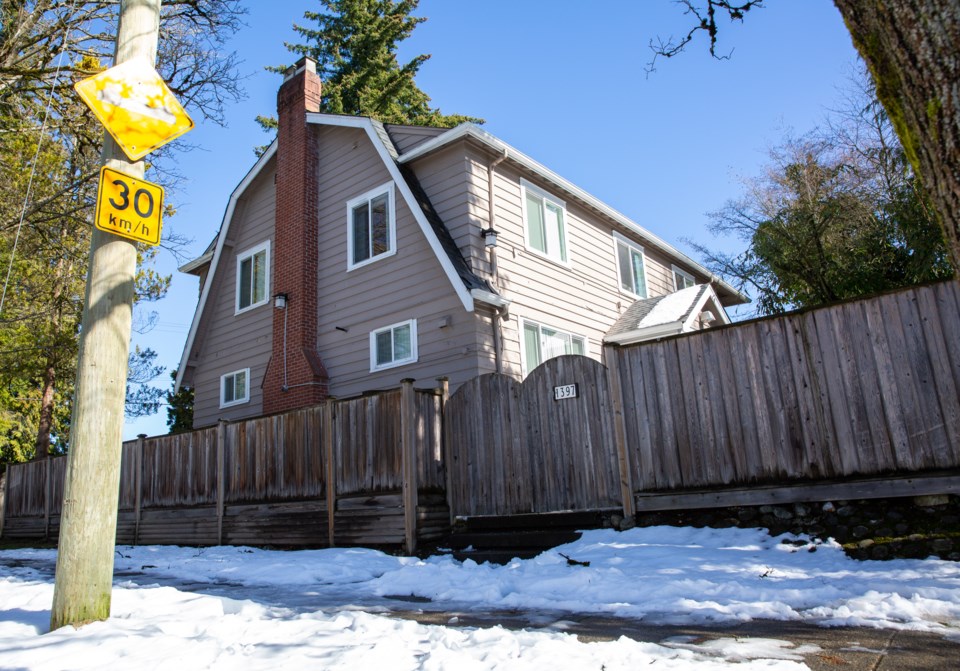A Shaughnessy homeowner found guilty in provincial court last year for operating a short-term rental business continued to list her 11-bedroom property on Airbnb and has also been running an illegal rooming house for students, a Vancouver council-led business licence review panel heard Wednesday.
Koji Miyaji, the city’s deputy chief licence inspector, said Chi Wah (Shirley) Pang was convicted in April 2022 of operating a short-term rental business without a licence at her house near 41st Avenue and Granville Street.
Such an offence prohibits a person from listing their property as a short-term rental for five years, but the panel comprised of councillors Lisa Dominato, Mike Klassen and Pete Fry heard that Pang had Airbnb guests stay at her house as recently as January of this year.
“She's aware that she does not have a licence, and yet continued to have this fairly aggressive activity to a point where we also suspect maybe there was a booking in February,” Miyaji told the panel. “It is not that often where we find non-compliance to this nature after somebody has been to court and pled guilty.”
$700 rent for rooming house
The panel also heard three bedrooms in the low-ceiling basement — all numbered and with their own locks — were recently discovered as being rented to students for $700 each per month and that an illegal tenanted suite was part of the house.
Numerous violations, including a kitchen built without permits, were cited by Miyaji, who visited Pang’s house last month as part of the city’s investigation, which dates back to January 2020 when Pang had a licence but voluntarily cancelled it in May 2020.
The result of the city’s recent findings has led to parallel compliance and enforcement orders — one for the short-term rental business, the other for issues related to the rooming house and illegal suite.
Pang has a court date in April to face charges related to the recent Airbnb listings.
“This may be one of the very few [cases] — if not the only one — that's gone to court twice on the same offence,” Miyaji said.
City inspectors are scheduled to visit Pang’s house next week to investigate the status of the illegal rooming house and suite. Miyaji said there is recent evidence that another tenant is staying in the house and has applied for a short-term rental licence.
'I don't do short-term anymore'
The reason Pang was before the panel is because she applied online in December 2022 for another licence to operate a short-term rental business at her house. Miyaji said the licence was issued in err Dec. 20 and cancelled Jan. 5.
Pang told the panel she was confused by the cancellation. She appeared in the council chamber Wednesday and admitted to operating a short-term rental business during the early days of the pandemic to supplement her income.
She has told the students, who were paying $700 each per month in rent, that they now have to move out. Pang said she has done recent work — with permits — to upgrade the illegal suite.
“I don't do short-term anymore,” she told the panel, adding that she allowed guests to stay in January because they had made earlier bookings. “I'm not a complicated person. I just really wanted to earn some money for my living support.”
Pang spent most of her time at the microphone complaining about Miyaji and his visit to her house, which he was entitled to do as part of his job as deputy chief licence inspector. Pang said at least twice during her submission that she wasn’t “a drug dealer,” but felt like she was treated like one.
Miyaji’s response: “Through my visitation there I did not find her to be truly honest. If she has nothing to hide, then I don't know why this would be a concern.”
Pang pleaded with the panel not to ban her from obtaining a short-term rental licence for the next five years. Through tears, she said the pandemic had been “a heavy situation” for her and believed recent renovations would allow her to operate short-term rentals again.
The panel was unanimous in ensuring Pang does not receive another short-term rental licence.
Dominato acknowledged the hardship identified by Pang during the the pandemic but noted the “repeated pattern of behaviour” of contravening city bylaws, including operating an illegal rooming house.
“Those bylaws were put in place in the interest of trying to protect housing stock for residents who are living here and to have long-term rental supply available,” she said, noting many homeowners abide by the bylaw.
“At this time, I don't have confidence in issuing a new business licence because I'm not confident that the behaviour is going to change.”
'Entirely the job of our staff'
Fry pointed to the low basement ceilings and concerns about life safety in the event of a fire at the house. He also defended the work of Miyaji and city staff.
“I just want to disabuse the notion that perhaps there was some kind of inappropriate activity by our staff in inspecting these premises,” he said. “This is entirely the job of our staff.”
The city first began regulating short-term rentals in April 2018 to help protect long-term rental housing and allow residents to earn additional income.
Under the bylaw, a person who provides temporary accommodation in a dwelling unit other than a bed and breakfast or hotel is deemed a short-term rental operator and is required to obtain a business licence.
The accommodation must be provided in the operator’s principal residence. The bylaw says an operator can rent their entire home, or a room within that home, for less than 30 consecutive days at a time.
@Howellings



